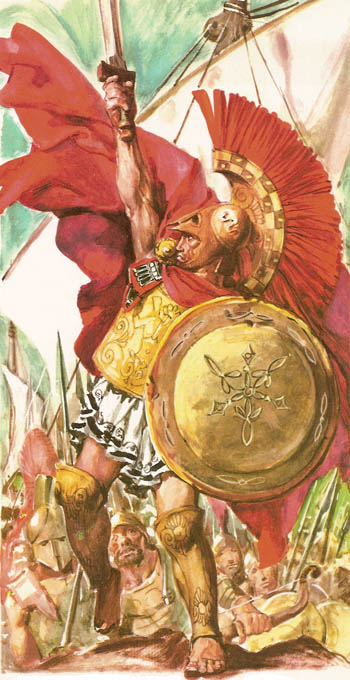 After reading Aristotle’s Book 1 on Rhetoric I found some
new insight by rereading Pericles’ Funeral Oration. One might look at this
ceremonial speech as a tribute to those who had fallen, but based on some
historical background discussed our class and guided by Aristotle’s Rhetoric,
we might see that things aren’t always as they seem. While it might have seemed
to the Athenians that Pericles was honoring the fallen warriors, I believe that
Pericles was using the ceremony as an opportunity to promote his own desires.
After reading Aristotle’s Book 1 on Rhetoric I found some
new insight by rereading Pericles’ Funeral Oration. One might look at this
ceremonial speech as a tribute to those who had fallen, but based on some
historical background discussed our class and guided by Aristotle’s Rhetoric,
we might see that things aren’t always as they seem. While it might have seemed
to the Athenians that Pericles was honoring the fallen warriors, I believe that
Pericles was using the ceremony as an opportunity to promote his own desires.
A typical epideictic speech focuses on displaying, singling
out, and praising specific virtues of an individual such as courage, honor,
charity, or strength as shown by Pericles as he discusses the sacrifice of the
warriors. What was interesting to me was
the virtues that Pericles singled out and praised were the very virtues he
hoped to see in the Athenians that would help promote his dream of establishing
an empire.
I agree with you that he was definitely using the opportunity to his advantage, but don't discount that he was praising his men at the same time. In a way this helped his cause even more; after all, in the Greek society a life was only respectable if honored in death. By keeping that tradition alive Pericles offered another reason for his men to continue fighting bravely and unquestionably.
ReplyDeleteI love your insights! In my blog post I actually talked about a lot of similar items. I found his speech odd the first time I read it and now that I read Aristotle's Rhetoric it makes more sense. I discussed how he was disguise a deliberative oratory for an epideictic oratory.
ReplyDeleteI appreciated your post. I tend to agree with your thought process in identifying that their was more to the speech than simply praising. It's important that we do not speak in absolutes. I think part of being able to truly be persuasive in speech is the ability to use each branch of oratory to internalize the message for the listener. To only focus on the present would defeat the purpose of the past. For example, to only praise the dead would be an insult to them because the men who died for Athens died so that the future would be better. Good thoughts James!
ReplyDelete